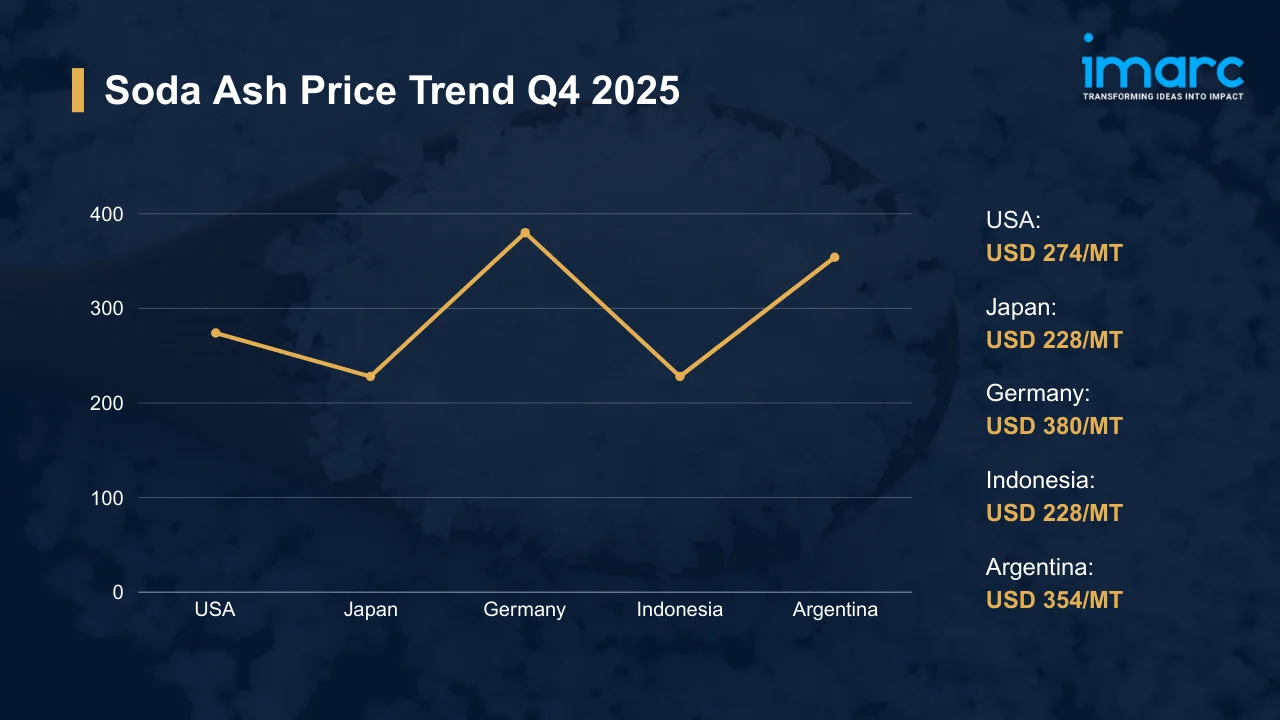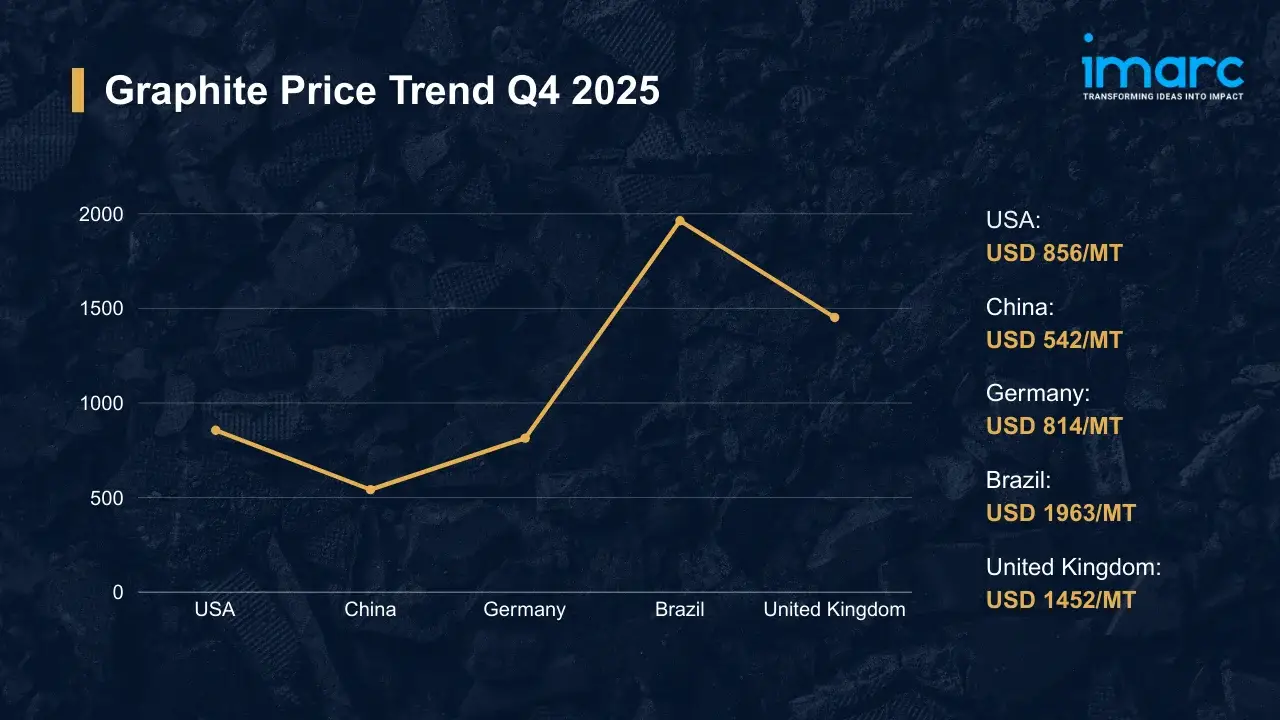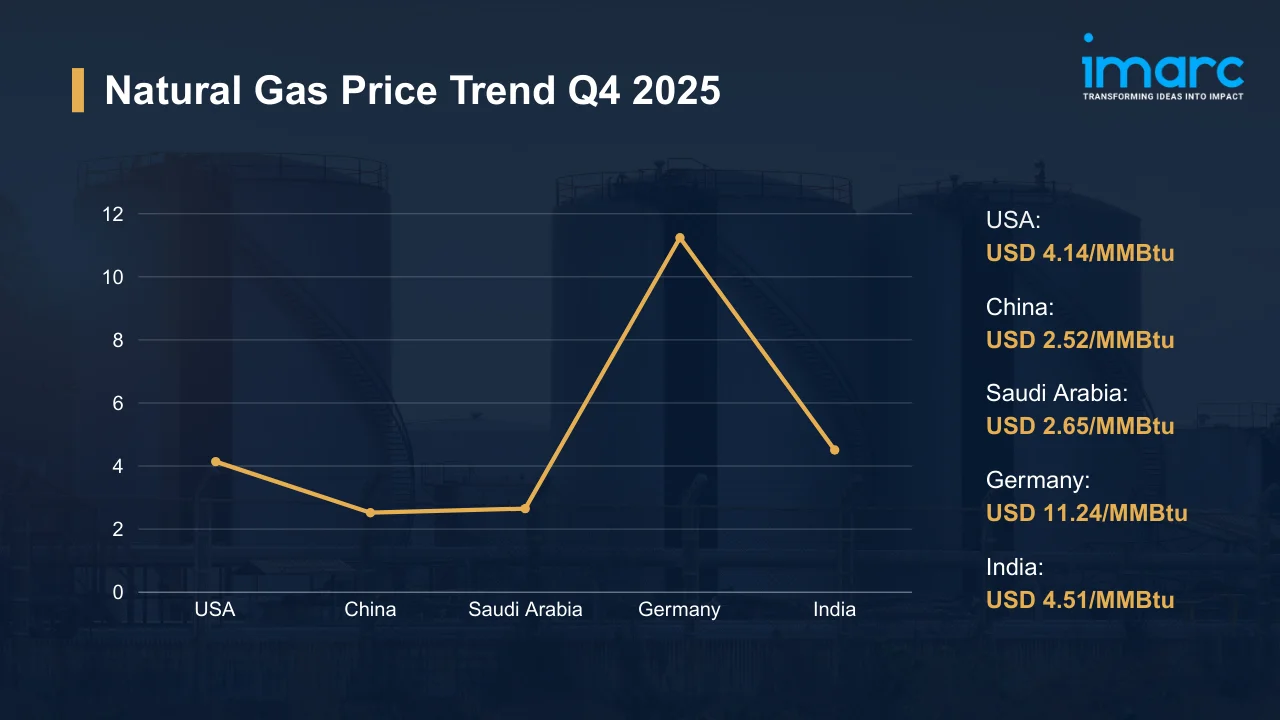Graphite Prices Stabilize as Supply Chain Pressures Ease in Q3 2025
30-Oct-2025.webp)
The global graphite market presented a mixed pricing environment in Q3 2025, shaped by softer demand from battery and automotive applications in Asia, steady industrial consumption in Europe, and stable import availability across the Americas. According to IMARC Group’s latest publication, “Graphite Prices, Trend, Index and Forecast Data Report 2025 Edition,” which provides updated insights for Q3 2025, most markets recorded mild declines or marginal gains as supply conditions improved and logistics costs remained contained. Pricing dynamics were influenced by North America, Asia Pacific, and Europe, where operating costs, environmental compliance, and import flows defined market performance.
Q3 2025 Graphite Prices:
- USA: USD 876/MT
- China: USD 573/MT
- Germany: USD 806/MT
- Brazil: USD 1942/MT
- United Kingdom: USD 1425/MT
Current price levels reflect graphite’s critical role across energy storage, industrial processing, and construction applications, with steady end-use demand and manageable supply-side conditions supporting a broadly stable pricing backdrop in Q3 2025.
Key Regional Price Trends and Market Drivers:
USA
In Q3 2025, graphite prices reached USD 876/MT. The decline was driven by slower domestic manufacturing demand for battery-grade graphite and reduced activity in key end-use sectors. Supply pressures eased on steady imports from Asia and improved domestic production capacity, while logistics and transportation costs remained stable.
China
Prices averaged USD 573/MT in September 2025. A sharp fall reflected weaker demand from automotive and battery manufacturers as production schedules were curtailed. Policy-driven output adjustments and greater availability from local mines, combined with lower raw material costs and eased logistics constraints, exerted downward pressure.
Germany
Germany recorded USD 806/MT in September 2025. A moderate increase was supported by sustained demand from manufacturing and construction for high-purity grades. Limited availability from domestic processors and stable international freight added incremental costs, alongside EU environmental and safety compliance.
Brazil
Brazil reached USD 1942/MT in September 2025. Slight gains were supported by steady demand from refractory and battery applications. Consistent domestic production underpinned supply, while port handling, rail fees, and minor currency effects added marginal cost pressure amid adherence to local environmental and quality standards.
United Kingdom
The UK posted USD 1425/MT in September 2025. Increases were influenced by consistent demand from industrial and energy storage sectors for high-purity graphite. Moderate supply pressure persisted, with domestic output covering part of demand and imports filling the gap; port handling and distribution costs contributed to incremental price rises.
Q3 vs Q2 2025:
| Country | Q3 2025 (USD/MT) |
Q2 2025 (USD/MT) |
Q3 vs Q2 Trends |
|---|---|---|---|
| USA | 876 | 914 | Prices decreased on slower battery and industrial demand; improved supply and stable logistics softened the market |
| China | 573 | 631 | Sharper decline due to curtailed EV/battery production, increased local availability, and lower raw material costs |
| Germany | 806 | 786 | Modest increase on steady industrial demand and compliance-related costs despite stable shipping |
| Brazil | 1942 | 1917 | Slight rise supported by refractory/steel demand; logistics and standards compliance added marginal costs |
| United Kingdom | 1425 | 1380 | Prices firmed on consistent industrial and energy storage demand; import reliance and distribution costs lifted levels |
To access real-time prices Request Sample
Graphite Industry Overview:
The global graphite market reached USD 26.96 Billion in 2024 and is projected to grow to USD 49.57 Billion by 2033, expanding at a CAGR of 6.65% during 2025-2033. Growth is driven by strong demand in lithium-ion batteries, industrial lubricants, refractories, and renewable energy applications, alongside rising electric vehicle adoption and expanding steel and construction activity. Stable supply from domestic and imported sources, combined with ongoing processing and distribution efficiencies, supports procurement across major regions.
Structural demand tailwinds include the electrification of transport, energy storage buildouts, and industrial expansion. Capacity investments in synthetic and natural graphite processing, as well as raw material localization efforts, are expected to strengthen supply chains. Compliance with environmental and safety standards across the U.S., Europe, and key producing markets will remain an integral component of cost structures and long-term planning.
Recent Market Trends and Industry Analysis:
Graphite remains a strategic material due to its conductivity, thermal stability, and suitability for high-temperature and electrochemical applications. The market continues to be propelled by lithium-ion battery demand, steady refractory usage in steelmaking, and industrial applications in lubricants and metallurgical processes. In Q3 2025, Asia’s battery sector slowdown weighed on prices, while Europe’s industrial demand and compliance-related costs supported selective firmness.
Key drivers include EV-led battery manufacturing growth, investments in anode-grade production, and logistics improvements that stabilize import flows. Policy actions affecting exports, energy costs for processing, and adherence to environmental regulations shape procurement and pricing. As supply chains diversify and downstream applications broaden, graphite remains central to energy transition technologies and core industrial operations.
Strategic Forecasting and Analysis:
IMARC’s report incorporates forecasting models that project near-term price movements based on evolving trade policies, raw material supply, and technological trends. These tools enable businesses to mitigate risk, enhance sourcing strategies, and support long-term planning.
- Key Features of the Report
- Price Charts and Historical Data
- FOB and CIF Spot Pricing
- Regional Demand-Supply Assessments
- Port-Level Price Analysis
- Sector-Specific Demand and Supply Insights








.webp)




.webp)












